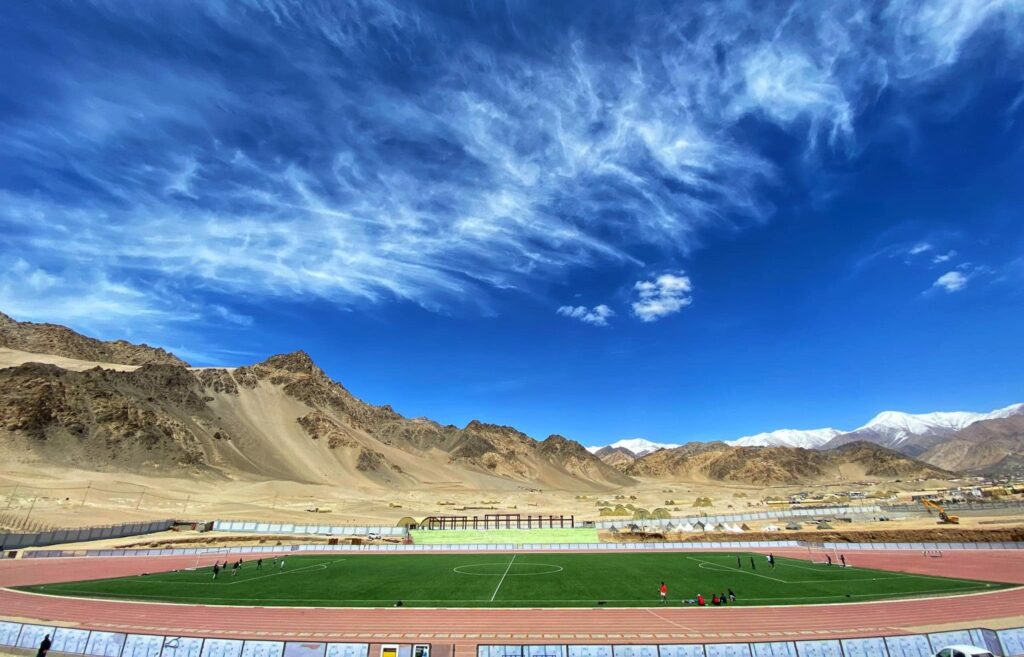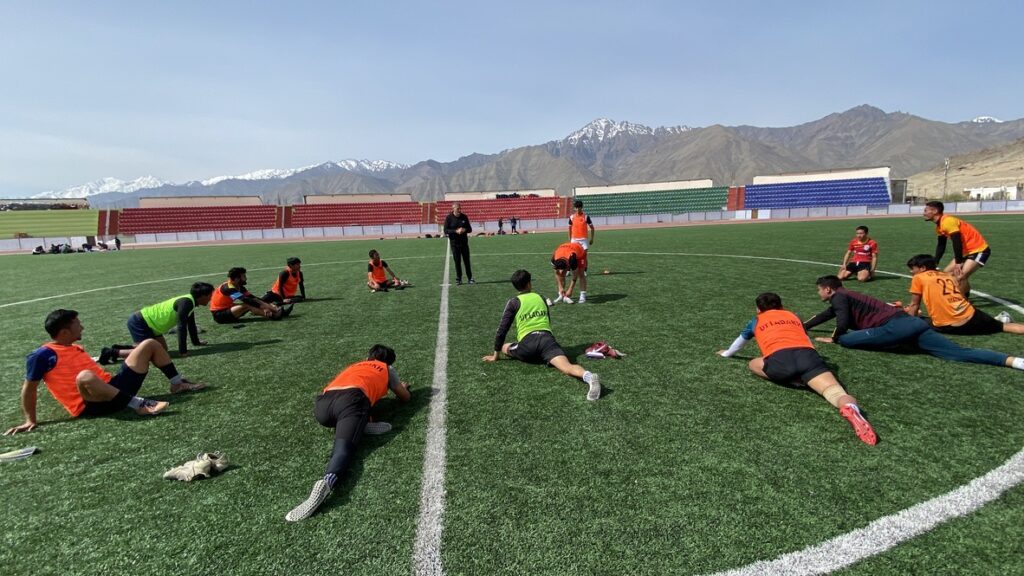How an Indian football club at 11,000 feet is driving climate change consciousness: Meet 1 Ladakh FC
In the heart of India’s Leh Ladakh region, popularly known as the ‘roof of the world’, is a football stadium 11,000 feet above sea level. With a view of snow-capped mountains in the distance, a sense of serenity accompanies the Spituk Football Stadium. Enjoying sport at such a venue located in one of India’s most scenic regions is a distant dream for many, but a reality for those who live in Leh Ladakh. At the same time, the challenges of life above 11,000 feet, including lack of oxygen, extreme winters, and irregular monsoons are also their reality. And the rapidly increasing impact of climate change is making things a lot more difficult.
Which is why 1 Ladakh FC, the team that calls the Spituk stadium home, is using sport to spread climate change awareness in the local community and beyond.
Climate change is completely shifting the dial for the residents of Ladakh, which received more than 10,000 per cent of its typical rainfall last July. Floods, droughts, and landslides have become more frequent. The region’s abundant glaciers are melting at a rapid pace, thus impacting water supply for millions. Snowfall has been impacted. Temperature fluctuations and extreme weather patterns are causing ecological shifts and affecting the region’s biodiversity, while tourism has also been severely impacted.
Formed only last year, 1 Ladakh FC already has the distinction of being the Union Territory (UT) of Ladakh’s first professional football club and the highest-altitude football stadium in the country. But its founders, Shamim Meraj and Tsering Angmo, wanted the club to stand for something important beyond football. Despite those attractive distinctions, 1 Ladakh FC is proudest of its identity as India’s only climate-conscious football club.
“I wanted to form a club that stands for something. Ladakh is a place bearing the brunt of climate change,” Meraj tells the Sports Gazette.
Meraj wants the club to be a lighthouse on India’s rooftop, spreading awareness about climate change and urging people to think more about their carbon footprint. “The idea is to get a dialogue started through football,” Meraj adds. “Even if we can turn one per cent of the population in and around Ladakh into climate-conscious citizens, that’s a great start.”

Meraj reveals the club’s aim of achieving net zero by 2027. They are even in talks with ‘Football for Future’ to work on an efficient plan to minimise their carbon footprint. Urging squad members to travel by bicycle, waste reduction, locally sourced organic food, and most importantly minimal air travel are among the initiatives already undertaken. But another crucial stand taken by 1 Ladakh FC and often neglected by many – as evidenced by FIFA’s recently-announced global partnership with state-owned fossil fuel company Saudi Aramco – is to work with climate-conscious sponsors.
“Unless they (sponsors) commit to dropping their carbon footprint or take serious steps to go green, only then will we go ahead,” Meraj states. It’s tough to say no to a prospective sponsor, but if we don’t do it now, we will never be able to do it.”
The Ladakh-based club, which plays with jerseys made of 100 per cent recyclable materials, organised and hosted the first-of-its-kind Climate Cup last year, Asia’s first-ever tournament to be held at over 11,000 feet. However, the main aim was to conduct an event with a minimal carbon footprint. Teams used e-buses to travel, plastic use was banned, and players were given reusable bags and refillable aluminium water bottles. Local food vendors were encouraged to sell their products at the venue, thus promoting organic food as well as local businesses. Meraj specifically highlights the contribution of Tashi Gyalson, Chief Executive Councilor of Leh, for significantly helping the cause.
Hello big boys of #indianfootball ! Fancy a game here with us @11000ft ? Breathtaking views and breathless football. What say? @IFTWC @bengalurufc @atkmohunbaganfc @eastbengal_fc @MumbaiCityFC @KeralaBlasters @OdishaFC @HydFCOfficial @FCGoaOfficial @JamshedpurFC @IndSuperLeague pic.twitter.com/nCKBYHDW8v
— 1 LADAKH FC (@1LadakhFC) April 6, 2023
1 Ladakh can be within India and Asia what Forest Green Rovers has been in the UK and Europe, revolutionising the climate dialogue within sport. But for that, they must be able to spread the message widely and it will need the team to travel outside their region to make an everlasting impact on those they interact with.
“For someone like us just starting, it is important to travel so the message goes outside,” Meraj says. “Otherwise, this story will be stuck on a small hill at 11,000 feet and that’s not how our messaging must go out.”
Meraj is conscious of the fact that more air travel will also lead to a bigger carbon footprint and is working with his team to chart the most carbon-friendly plan of action for travel, such as using more public transport to go places and also finding more ways of offsetting their carbon footprint through travel. Having played only locally in its maiden year, 1 Ladakh aspires to compete in the I-League one day.
“The moral question is – what is more important, the messaging or the carbon footprint?”

To achieve their aim of spreading carbon literacy, 1 Ladakh will also need support from other clubs within Indian football and other sports, especially those with huge fan bases. In India, cricket is the obvious candidate. The question is, why are all these clubs not doing more already? Last year’s ICC World Cup in India did not set the best example for sustainability, even though one T20 cricket match is estimated to release 10,000 tonnes of carbon dioxide (CO2) in the air, or the equivalent of two million homes in a single day. While there are a few initiatives, the efforts of many big clubs and franchises in major sporting leagues pale compared to those of a bootstrapped football club only in its second year.
“We are the first ones to go clean and green in India,” Meraj says. “I’m surprised none of the big clubs in India, even in cricket, have sustainability officers. More shocked than surprised.”
As far as 1 Ladakh is concerned, immediate plans include amping up marketing and communications, along with potential collaborations involving Premier League clubs. That is accompanied by the aim to play in a professional league. But the goal is to be a leader in driving positive change, and at the heart of that effort is to ‘start them young.’
“If you can turn a kid at nine years old into a climate-conscious citizen, you can sleep at ease,” Meraj emphasises.